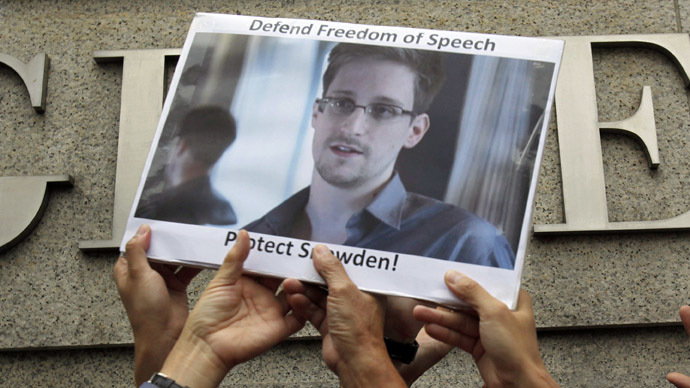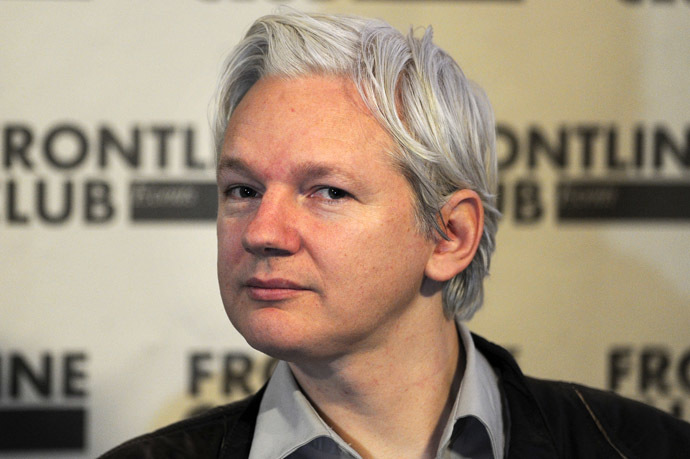‘Americans have no privacy left, no capacity to communicate without govt watching’

The US government pulls out all stops to prosecute, hound, and capture those who reveal classified data. This plus constant control and surveillance makes it impossible to keep anything private or secret, Pulitzer-winning journalist Chris Hedges told RT.
RT:The US is focused on chasing Snowden, which seems
to have distracted from his revelations - is anyone in the States
asking whether the surveillance system prism was
constitutional?
Chris Hedges: Some people are, but not many, which is
quite distressing. You have Glenn Greenwald, the journalist from
The Guardian who broke the story. You have lawyers Michael Ratner
from the Center of the Constitutional Rights asking those kinds
of questions, but I think that for those of us who care about
freedom of information, about protecting sources, about stopping
wholesale government surveillance, I think it’s been a very
lonely time. And I think one of the things that’s been so
distressing is that the serious questions that should be asked
are not being asked.
RT:Does that play into the hands of the government and
what Washington would like to keep secret?
CH: Well they can’t keep it a secret anymore, it’s
exposed. But I think what they have done is divert attention to
that kind of a mini-soap opera that is now taking place, as
Snowden leaps from Hong Kong to Moscow, to ostensibly Cuba,
Ecuador. They knew we saw the same thing happening to Julian
Assange, the founder of WikiLeaks, to Bradley Manning, who
exposed war crimes and is now on trial in military court in
Maryland. It’s a very similar and oppressing kind of scenario,
where the state propaganda machine has quite effectively diverted
attention away from where it should be, which is the effect that
there is no more privacy anymore left in the United States, and
focused attention on character, on activities of Snowden. Through
their lens, it’s not a dispassionate view of either Snowden or
what he’s done.

RT:When do you think Snowden might reveal his
whereabouts and where do you think he will go?
CH: He doesn’t have many options: Cuba, Ecuador, maybe
Venezuela, that’s about it. He has of course asked for political
asylum as [Assange did], although the British government isn’t
allowing him to leave the Ecuadorian embassy in London. I mean
these kinds of questions, again, for me are not the paramount
questions as a journalist. The fact that the government sees
virtually all the communications, electronic communications of
American citizens, means that I can’t work. I think one of the
reasons that Snowden went public with his disclosure is that he
knew quite well that the US government has all the communications
that Glenn Greenwald has made, and there was no way to hide those
kind of contacts between himself as a traditional whistleblower
and the journalist who wrote up this story of the wholesale
spying on most American citizens by the National Security Agency.
And that means that in essence you’re shutting down any capacity
to shine a light on the internal workings of power.
It becomes impossible to challenge the official narrative - and
let’s not forget that the government quite selectively leaks
classified information all the time to make themselves look good.
But once information is exposed, that tarnishes them, and I think
it’s quite clearly unconstitutional. Then the security and
surveillance state pulls out all stops to prosecute, hound and
capture those person or persons who made those revelations, and
that’s precisely what we’re seeing, it’s not an uncommon scenario
judging by what we’ve seen happening to Julian Assange and given
of course what’s been happening to Bradley Manning.
RT:The authorities say surveillance is essential to
counter terrorism. But does it justify daily spying on people,
including on heads of state?
CH: I covered Al-Qaeda for the New York Times and spent
seven years in the Middle East with a variety of Jihadist groups.
These people are well aware, acutely aware of the fact that all
of their communications is closely monitored by American security
and intelligence officials. So there’s nothing new in these
revelations to them. What is new is that we as Americans
essentially have no privacy left, no capacity to communicate
without the eye of the government upon every form of
communications that we make – that’s what’s new.
And that has nothing to do with terrorism, that has nothing to do
with national security, that has to do with control of the
population, as we see greater and greater effects - catastrophic
effects - from climate change as the very fragile global economy
again teeters on the brink of collapse, the security in
surveillance state wants the capacity to shut down any form of
dissent, and this mechanism of the wholesale surveillance gives
them precisely that.
The statements, views and opinions expressed in this column are solely those of the author and do not necessarily represent those of RT.












